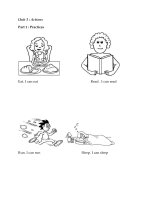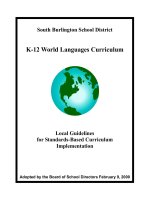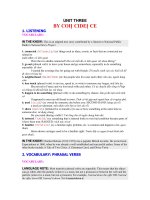Unit 3 curriculum ppt
Bạn đang xem bản rút gọn của tài liệu. Xem và tải ngay bản đầy đủ của tài liệu tại đây (345.67 KB, 28 trang )
Unit 3: Curriculum
Basic curricular structure
Discuss the following questions
1. Can students in Vietnam at every
level of education choose their own
subjects?
2. Are there any extra-curricular
activities at schools in your country?
3. What are extra-curricular activities?
Are they important? Why?
4. What do the schools often do to
support these activities?
Extra-curricular activitiesExtra-curricular activities
There are many types of extracurricular activities
such as sports, drama, music, dance, swimming,
table tennis, volleyball and various clubs are an
important part of the educational experience .
Participating in extracurricular activities enhances
both the intellectual and social development of
students.
By participating in any of these activities,
students learn teamwork and leadership skills.
They also the gain a sense of self-respect, self-
esteem, and self-confidence.
To propagandize the students to participate in the
movement.
To arrange activities in class.
To enhance life skills education.
To carry out the propaganda school education
cooperated with family and society education.
To organize the activities relating to literature and art,
sport…
Vocabulary
Counterpart: (n)
Specialize into (v)
Sophomore
Elective (n/adj)
Emphasize (v), emphasis (n)
Rigidity (n) rigid (adj)
Sequence (n)
Obtain (v)
Anatomy (n)
Nutrition (n)
Concept (n)
Avoid (v)
Task 1: Vocabulary
1.We should…………… the importance of language
learning in modern time.
2. We are students of English so we have to…………………
in language study.
3. There are variety of……………………… for you to
choose for this course.
4. The teacher explained the………………… of sexuality in
a very simple way.
5. Can students choose their field of study in their
……………… year?
6. If you can’t pass this exam, you won’t be able
to……………….your diploma.
7. I have been……………………a good job in her company.
8. His……………………in that company is reliable person.
emphasize
specialize
electives
concept
sophomore
obtain
offered
counterpart
Task 2: Read the text and answer the
questions.
1. When do most students in the United State begin to
specialize into a narrow field of study?
2. What are student sometimes encourage to do?
3. What does the example of “some states consider 70
(on a point scale) to be a passing grade while others
consider it to be 75 and others 60 prove?
In their sophomore year of college.
To take electives in the areas they are considering for a
career.
It proves the curriculum varies widely in quality and rigidity.
4. Does every high school offer the same wide
variety of elective course?
5. What factors will decide how many or what
electives to be included in the school curriculum?
6. The main purpose of this passage is to
No, it doesn’t.
The availability of such courses depends upon each
particular school’s financial situation.
C. Introduce the subjects that the students
do at school.
Task 3: Match the course with its contents.
Course Content
1.Science
2. Mathematics
3. Social Science
4. visual Arts
5. Performing Arts
6. Athletics
7. Publishing
8. Computers
9. Shop
10. Health
11. Foreign languages
K. biology, chemistry
f. algebra, geometry
b. American history.
a. Painting, photograph, photography
h. Drama, dance
i. football, baseball, gymnastics
d. journalism
e. word processing, programming
c. woodworking, automobile repair
m. nutrition, first aid
g. Chinese, Latin, Greek
Task 4: Find from the text equivalents for the
following Vietnamese words and phrases.
Ngành học:
Chuyên sâu vào:
Nhấn mạnh đặc biệt:
Sinh viên năm thứ hai:
Chứng nhận tốt nghiệp phổ thông:
Điểm đỗ:
Khoa học xã hội:
Giáo dục thể chất:
(Nghệ thuật tạo hình) hội hoạ:
Hoàn cảnh kinh tế:
areas / fields
specialize into
special emphasis
sophomore
High School Diploma.
passing grade.
Social Science
Physical education
Visual Arts
financial situation
Speaking:
Work in group and discuss these
questions about curriculum in Viet Nam.
1. When do students begin to specialize into a
narrow field of study?
2. Are there elective subjects in the curriculum for a
career? If there are, what are they?
3. What is your opinion about elective? Do you think
they are useful for students’ future career?
4. Does the curriculum vary in different colleges and
universities?
5. What are the typical minimum course sequence
the students must take to obtain a high school
diploma?
6. What are some common types of electives in high
school?
Curriculum in universities and colleges
Curriculum varies from university to university.
Based on the cirriculum framework defined by the
MOET, the directors of universities determine
curriculum to build the school's specific program.
Organized and compiled subjects approved
curriculum for use in formal schools, on the basis
of evaluation of curriculum evaluation council by
the director establishment.
The Model of
Curriculum Design
The nature &
structure of
knowledge
The needs of
the society
The needs of
the learner
Curriculum
General
education
knowledge
Academic
Knowledge of
Education
Basic
knowledge
of Education
Knowledge
of Education
Management
Compulsory Knowledge
Optional Knowledge
Probation/Practice
& Graduation Thesis
BA Course
Year 1 Year 2 Year 3 Year 4
Semester 1 Semester 2 Semester 3 Semester 4 Semester 5 Semester 6 Semester 7 Semester 8
Semester 1
No Subjects
No of Cps
1 Marxist Leninist Philosophy 6
2 Informatics 3
3 Backgrounds of Ethnology and
Religion
3
4 Logics 3
5 Sociology 3
6 Psychology 4
7 English 5
8 Physical Education 2
Total 29
Semester 2
No Subjects
No of Cps
1 History of the Communist Party of
Vietnam
4
2 Advanced Mathematics 5
3 Politics 3
4 Management Psychology 4
5 Management Science 5
6 English 5
7 Physical Education 3
Total 29
Semester 7
No Subjects
No of Cps
1
Education Inspection
3
2
Teaching Methods and
Technologies
3
3
English
5
4
Assurance and Accreditation of
Educational Quality
3
5
Situation and Situation Settling in
Education Management
3
6
Some optional subjects
7
Total 24
Semester 8
No Subjects
No of Cps
1
Graduation Probation/Practice
5
2
Graduation Thesis
10
Total 15
Basic curricular structure in General
Secondary Education in Vietnam
In Vietnam , most students start to specialize into their
narrow field of study in their third year of college.
At high school level: Students are required to follow the
National Curriculum, which is set by Ministry of Education
and Training. It consists of twelve subjects. The core
subjects - English, Mathematics and Literature are
compulsory for all students from grade 6 to grade 12. The
other foundation subjects are compulsory at one or more
Key Stages:
Literature (Vietnamese)
Mathematics (algebra, geometry, trigonometry)
Citizenship, (basic law, moral, Marxist Leninist Philosophy)
Technique (industrial technique)
Geography
History
Physics,
Chemistry
Biology
Informatics
Foreign Languages (English, French, Russian, German)
Military Education
Generally, at the high school level, students take a broad
variety of classes without special emphasis in any
particular subject. Besides, some elective subjects are
also given for students as technical and vocational
courses, information and technology, set up business…
The curriculum aims at students’ all-round
development in terms of morality, physical body, arts,
and basic skills so that they can be prepared to
pursue further studies.
Further practice:
Task 2 : Read the text and answer the
questions.
1. How long does elementary school last?
2. What subject do children learn in elementary
school?
3. What do school districts do?
6 years
Maths, library, music, art, physical education
The school district selects curriculum guides and
textbooks that are reflective of a state's learning
standards and benchmarks for a given grade level.
4. What is the main difference in school system in
the United States?
5. What are the roles of the teachers in school?
Making curricular decisions and how teaching
and learning take place.
Teachers play a significant role in curriculum
design and teaching.









